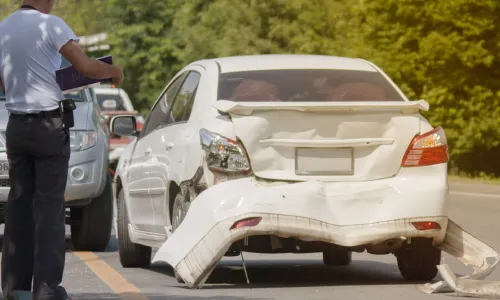 Can an Uninsured Driver Still Sue for Personal Injuries After an Accident?
Can an Uninsured Driver Still Sue for Personal Injuries After an Accident?Connecticut state law requires all drivers to carry liability insurance coverage in case of an accident, so how can that affect a driver who has experienced an accident they didn’t cause?
An accident is naturally a nerve-wracking experience, but the fear can be overwhelming for drivers without insurance. Along with the immediate physical concerns that a driver has after an accident, an uninsured motorist may also be worried about possible legal ramifications.
A lack of insurance is not a factor that determines fault in an accident, so an injured motorist may still be able to recover compensation for their financial and physical damages.
The best way to fully understand how your unique situation may affect an upcoming insurance claim or lawsuit is to contact a lawyer. A local uninsured motorist auto accident attorney can assess the details of your case and guide your next steps.
To learn more during a free, no-obligation consultation with Bert McDowell Injury Law, call (203) 590-9169 or contact us online.
Some states do not permit drivers to seek financial compensation from another motorist in most crash circumstances. Instead, they require that every driver carry personal protection auto accident coverage that they can lean on.
These states are called no-fault states. Currently, there are 12 no-fault states, but Connecticut is not one of them.
A driver who sustained injuries or property damage after an accident with another driver can seek financial compensation in Connecticut if they are deemed less than 50% at fault for the crash.
Our state follows a comparative negligence doctrine, which recognizes that not all accidents are caused by the actions of one motorist. In cases where multiple parties share responsibility, each party is expected to contribute their respective share according to how fault was apportioned.
Let’s say a driver speeds through a red light, hitting another motorist who was driving through the intersection in the wrong lane. This accident snares up a third driver, who was not violating any traffic laws at the time of the crash.
In this case, both the red-light-runner and the wrong-lane-user may split liability for accident damages 50-50, or through some other arrangement depending on the assigned portion of blame to each party.
Being uninsured does not affect liability. Whether or not a driver is insured does not impact their actions leading up to a crash, so it is not considered when analyzing evidence to determine fault. Insurance representatives and legal consultants will utilize other data such as police reports, street cameras, dash cams, witness statements, and scene reconstruction analysis to fault a driver after an accident.
An uninsured driver who was injured by another motorist in an accident can still recover damages, but there may be separate repercussions for failing to carry minimum coverage.
State law requires Connecticut drivers to carry liability coverage at a minimum of $25,000 per person, $50,000 per accident for bodily injury, and $25,000 for property damage. As of 2018, most Connecticut municipalities also require drivers to carry $25,000 per person and $50,000 per accident in uninsured/underinsured motorist coverage.
A driver who violates this insurance statute is subject to a fine of $100 to $1,000 and the suspension of their driver’s license and registration. The first suspension will last one month and any subsequent conviction will last six months.
The DMV will not remove the suspension until the driver can provide evidence that they have sufficient coverage. There will also be a $175 DMV restoration fee.
In short, there are penalties for driving without insurance, but the fines are completely separate from your ability to seek compensation after a car accident.
After enduring a car accident, it is understandable to wonder what exactly can be covered in a settlement and what you may be left to pay for out-of-pocket. The goal of an attorney is to maximize all benefits and prevent the client from paying for expenses that can be covered by their settlement.
Every accident is different, so every accident settlement will look a bit different, too.
Generally, a plaintiff can recover compensation for a combination of damages, including but not limited to:
The victim of a car accident can take immediate steps to protect their financial recovery later. Whether you end up filing a claim or a formal lawsuit, follow the steps below to collect sufficient evidence for the upcoming litigation process:
In the event the liable driver has no insurance or not enough insurance, your lawyer may suggest filing a formal lawsuit to make up a comprehensive settlement. The steps to filing a personal injury lawsuit after an auto accident are as follows:
The complicated nature of insurance claims can make financial recovery after an accident feel confusing, but a lawyer can shine some light on how to proceed. Even without insurance, an accident victim can seek compensation and start fresh after the a crash, and an attorney can help seek to maximize the benefits you see and recover fully from all damages you have suffered.
Schedule a free case review with an uninsured motorist car accident attorney in Connecticut today when you call Bert McDowell Injury Law at (203) 590-9169 or contact us online.